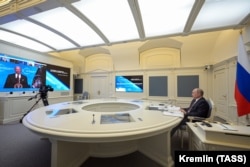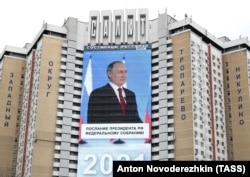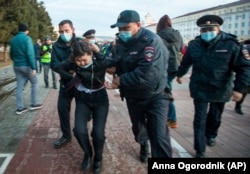Amidst talk of a potential summit with U.S. President Joe Biden, Moscow appears to be switching to tactics of downplay and dodge toward reports of neglected medical care for jailed opposition leader Aleksei Navalny, now into his fourth week on a hunger strike in protest at prison officials’ refusal to grant him access to non-prison physicians.
Toward voters, the Kremlin, which faces parliamentary elections this September, appears to be attempting to show that “all these problems” with Navalny are resolved, and that his supporters are not so numerous, commented Russian political scientist Nikolai Petrov.
Nonetheless, defying international and domestic criticism on Navalny remains part of Moscow’s stance toward both foreign critics and Russian voters. Still, a change in tactics appears to have begun, analysts say.
Most notably, on April 20, a day ahead of nationwide, pro-Navalny protests, Russian prison officials removed one justification for the 23-day hunger strike that has sparked warnings of “severe consequences” from the United States should death result.
Navalny, currently imprisoned in the IK-3 prison hospital in the regional town of Vladimir, received access to “something resembling an independent examination” at a non-prison hospital in the town, Navalny’s personal physicians announced on April 22.
A neurologist, neurosurgeon, and nephrologist met with Navalny to address complaints about limb numbness and prior laboratory results that the activist’s own medical team believed could predicate cardiac arrest and kidney failure. The Navalny physicians say they have received “all the medical conclusions and results” from the April 20 examination.
As a result, they appealed to the politician to end his hunger strike gradually. “[W]e consider the fact that civilian doctors had access to him, [and] objective examinations and a consultation (with Navalny’s doctors – ed) were held to be sufficient for this,” wrote Drs. Yaroslav Aishikhman, Andrei Erlikh, Vsevolod Shurkhai, Andrei Plotnikov, and Anastasia Vasiliyeva in a statement republished by the independent outlet Mediazona.
Thanking his supporters, Navalny announced on Instagram on April 23 that he had decided to end his hunger strike.
As of early April 23, neither the U.S. nor the European Union appeared to have responded publicly to his consultation with civilian physicians in Vladimir. The topic was not addressed during the online, U.S.-organized Climate Summit, which Russian President Vladimir Putin attended on April 22.
The warnings, which Moscow already has rejected as attempts to destabilize the country, continued, however.
U.S. Senator Bob Menendez, chairman of the Senate Foreign Relations Committee, again repeated warnings of sanctions on individuals and Russia’s “banking and financial systems” should the activist not be immediately released and receive “proper medical treatment,” TheHill reported.
French Foreign Minister Jean-Yves Le Drian stated that France will hold Russia responsible should Navalny die in custody.
The Parliamentary Assembly of the Council of Europe, the continent’s largest human-rights monitor, demanded Navalny’s release from prison before June 7, 2021, when the Council of Europe’s 47 foreign ministers will meet.
Navalny, the target of a 2020 nerve-agent poisoning he attributes to Russia’s Federal Security Service, was sentenced to 2 ½ years in prison this February for allegedly not observing the rules for his parole in a 2014 embezzlement case.
Leonid Slutsky, chair of the State Duma’s International Relations Committee, rejected PACE’s statement as “hysterical appeals” and “a diktat.” Nonetheless, he stressed, Russia will not respond to “a provocation” and “slam the door on the Council of Europe.”
Rather, it appears to be trying to downplay Navalny.
In April 22 remarks to reporters, Kremlin spokesman Dmitry Peskov stressed that Navalny’s medical care in prison “is not an issue that’s on our agenda.” He advised that complainants address the Federal Penitentiary Service or prosecutors.
He also redirected questions about the April 21 Navalny protests to the Interior Ministry.
Rather than the rallies, President Putin’s annual presidential state-of-the-nation address was “the main event” of the day, he stressed.
That speech was as significant for what it said as left unsaid, Russian analysts believe.
Aside from a claim that a coup had been attempted in ally Belarus, Putin largely skirted foreign policy; in particular, the buildup of Russian troops along the border with Ukraine, which has sparked warnings in the West of a potential Europe-wide war.
To political analyst Arkady Dubnov, that omission was a critical “signal” to U.S. President Biden that “We’re ready to meet with you.” Earlier this month, Biden had proposed a summit with the Russian president, a proposal the Kremlin has said it will consider, but has not yet officially accepted.
Following Putin’s speech, the Defense Ministry on April 22 ordered the start of a withdrawal of Russian troops from the Ukrainian border.
Nonetheless, while noting that “We really don’t want to burn bridges,” Putin stressed that “Russia’s answer will be asymmetrical, rapid, and tough” if “someone” interprets “our good intentions as indifference or weakness.”
“The organizers of any provocation threatening the root interests of our security will regret the deed like they haven’t regretted anything in a long time already,” Putin said.
International media saw the West as the target of that warning, but it
could also apply to Navalny, routinely depicted in government-controlled mass media as a collaborator with Western intelligence agencies.
On April 26, the activist’s regional offices and Anti-Corruption Foundation face a hearing over whether they should be labeled “extremist” for supposedly encouraging “the destabilization of the social and socio-political situation."
Some analysts believe Putin’s roughly 78-minute speech was structured to forestall any such “destabilization” via the April 21 rallies for Navalny.
Criticized by Russian political analyst Fyodor Krasheninnikov as an attempt “to buy” voters, the speech focused largely on a 400-billion-ruble ($5.3 billion) socio-economic package that includes monthly payments of 5,650 rubles ($75) to children between the ages of 8 and 16; a single payment of 10,000 rubles ($133) to all elementary and secondary school students; and monthly payments of 6,350 rubles ($84.48) to low-income pregnant women.
Aside from this, major infrastructure projects were promised for the regions.
“Putin yesterday didn’t give protesters the smallest chance to
latch onto anything because his speech was aimed at social issues,” Moscow political analyst Konstantin Kalachyov, head of the Political Expert Group collective, remarked on April 22. “The anticipated war didn’t happen.”
“If Putin’s speech had been somewhat different, then it would have been possible to add to the number of protesters in the streets,” Kalachyov continued. “But who’s against help to pregnant women, to children, or who’s against developing the regions?”
The Interior Ministry reported 14,400 people nationwide attended the protests, but other estimates put that number within the range for Moscow alone – an estimate that Navalny’s colleagues consider far too low. Ahead of the rallies, their Free.Navalny site registered 466,491 expressions of interest in protesting.
Compared with three previous unauthorized rallies for Navalny, the 1,926 reported detentions ranked as the second-lowest of the year, after February 2 protests that saw 1,512 detained, according to independent police watchdog OVD-Info.
Petrov attributed this restraint to Putin’s speech and “the Kremlin not wanting to have a negative social background during the release of this message.”
In Moscow, the main focus of both international and domestic media, 31 detentions, an unusually low rate, were reported by OVD-Info. Protesters moving “freely” through the city center was “unexpected” to Dubnov, who marched with the demonstrators.
But law enforcement’s response was not uniformly restrained.
In St. Petersburg, which topped the national list of detentions with 826 detainees, OVD-Info reported extreme police tactics, including electric shockers and the tackling detentions of passersby. Ninety-four complaints have been registered with the city ombudsman’s office.
Elsewhere, from Kaliningrad to Ulan-Ude. police beatings, denying detainees food and water or access to a lawyer, and confiscating cell phones, among other alleged violations, were reported across the country.
Navalny activists, including Anti-Corruption Foundation lawyer Lyubov Sobol and spokeswoman Kira Yarmysh, have been detained and, in many cases, sentenced to administrative arrests as well.
But to former Putin speechwriter Abbas Gallyamov, now a critic of the president, the change from sweeping detentions indicated a change in tactics on Navalny, AP reported.
“They chose an unsuccessful strategy,” Gallyamov commented to Current Time. “And when you have an incorrect strategy, then, tactically, your maneuvers aren’t capable of changing anything, in reality.”
Whether or not Moscow’s strategy on Navalny will now succeed – at home or abroad – remains moot.
--With additional reporting from Interfax, Reuters, and TASS













